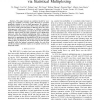Free Online Productivity Tools
i2Speak
i2Symbol
i2OCR
iTex2Img
iWeb2Print
iWeb2Shot
i2Type
iPdf2Split
iPdf2Merge
i2Bopomofo
i2Arabic
i2Style
i2Image
i2PDF
iLatex2Rtf
Sci2ools
130
click to vote
GLOBECOM
2006
IEEE
2006
IEEE
Improvement of WLAN QoS Capability via Statistical Multiplexing
Abstract— This paper presents an analytical model for evaluating the capability of wireless LANs (WLANs) to provision quantitative quality of service (QoS) guarantees. We consider a distributed medium access control (MAC) with class differentiation, where mobile nodes belonging to different classes may have heterogeneous traffic arrival processes or different contention windows. With on/off inputs, our analysis shows that the WLAN admission region under the QoS constraint can be significantly improved, when the statistical multiplexing effect is taken into account. Moreover, the statistical multiplexing gain can be further improved by aggregating the downlink flows at the access point (AP). We also demonstrate that the proper selection of contention windows plays an important role in improving the WLAN QoS capability, while the optimal contention window for each class and the maximum admission region can be jointly solved in our analytical model.
Analytical Model | Contention Window | GLOBECOM 2006 | Statistical Multiplexing | Telecommunications |
| Added | 11 Jun 2010 |
| Updated | 11 Jun 2010 |
| Type | Conference |
| Year | 2006 |
| Where | GLOBECOM |
| Authors | Yu Cheng, Lin Cai, Xinhua Ling, Wei Song, Weihua Zhuang, Xuemin Shen, Alberto Leon-Garcia |
Comments (0)

